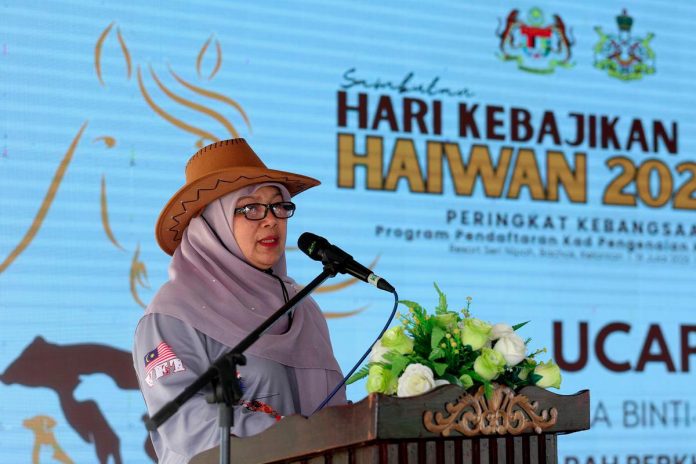BACHOK: The Department of Veterinary Services (DVS) has received a total of 12,417 complaints involving animal abuse, neglect and welfare issues since 2021.
DVS director-general Dr Akma Ngah Hamid said that of the total, 249 cases were recorded in 2021, 1,249 in 2022, 1,580 in 2023 and 4,133 in 2024, while 2,533 cases have been reported so far this year as of July 10.
“To date, 1,407 licences have been issued for activities involving live animals, including 542 licences for the sale of live animals in captivity and 865 for their accommodation,” she said.
Dr Akma said that failure to comply with animal welfare requirements, whether as owners or licensees, could result in a fine of not less than RM15,000 and not more than RM75,000, imprisonment for up to two years, or both.
She said this to reporters after attending the National Animal Welfare Day 2025 celebration and the Horse Identification Card Registration programme here today.
Dr Akma said animal welfare covered not only ruminants but also pets, including dogs, cats, rabbits and horses.
“In addition to providing adequate food and water, animal welfare is also assessed based on five main pillars, namely proper nutrition, a comfortable environment, good health, natural behaviour, and emotional well-being,” she said.
Commenting on this year’s National Animal Welfare Day theme, “Pemilik Prihatin, Haiwan Terjaga”, Dr Akma said it aimed to raise awareness on the importance of pet owners being responsible in protecting the welfare of their animals.
“I believe that if owners are dedicated and committed, their pets will be treated like part of the family,” she said.
Meanwhile, Kelantan DVS director Dr Yahasmida Yaacob said the programme focused on efforts to ensure that all horses in the state were legally registered and issued with Horse Identification Cards.
According to her, microchips served as a unique identification mark for each horse, while the identification card contained the legal owner’s details and the animal’s health records, including vaccinations and treatments, to ensure effective husbandry.
She said the programme also aimed to instil a sense of responsibility among owners to mark their animals with proper identification for their animals through identification cards and microchips.
At today’s programme, nearly 100 horses were equipped with microchips and issued identification cards.
Other activities held during the programme included the Smart Horse competition, briefings on animal welfare and horse identification cards, horse riding, colouring competitions, as well as exhibition and sales booths. – Bernama







